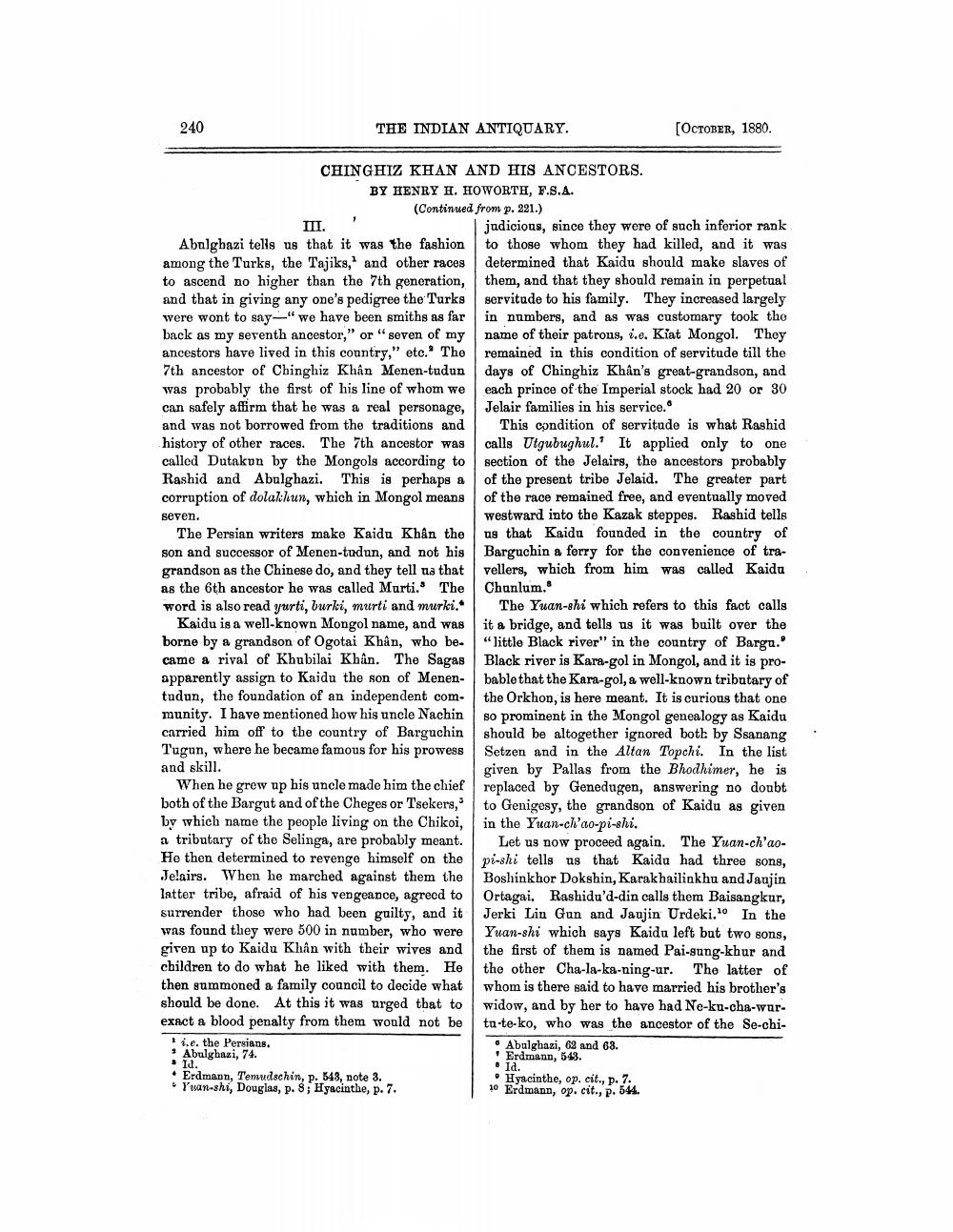________________
240
THE INDIAN ANTIQUARY.
[OCTOBER, 1880.
CHINGHIZ KHAN AND HIS ANCESTORS. BY HENRY H. HOWORTH, F.S.A. (Continued from p. 221.)
judicious, since they were of such inferior rank Abulghazi tells us that it was the fashion to those whom they had killed, and it was among the Turks, the Tajiks, and other races determined that Kaidu should make slaves of to ascend no higher than the 7th generation, them, and that they should remain in perpetual and that in giving any one's pedigree the Turks servitude to his family. They increased largely were wont to say—" we have been smiths as far in numbers, and as was customary took the back as my seventh ancestor," or "seven of my name of their patrons, i.e. Kiat Mongol. They ancestors have lived in this country," etc. The remained in this condition of servitude till the 7th ancestor of Chinghiz Khan Menen-tudun days of Chinghiz Khân's great-grandson, and was probably the first of his line of whom we each prince of the Imperial stock had 20 or 30 can safely affirm that he was a real personage,
a real personage, Jelair families in his service. and was not borrowed from the traditions and This condition of servitude is what Rashid history of other races. The 7th ancestor was calls Utgubughul.' It applied only to one called Dutakun by the Mongols according to section of the Jelairs, the ancestors probably Rashid and Abulghazi. This is perhaps a of the present tribe Jelaid. The greater part corruption of dolalhun, which in Mongol means of the race remained free, and eventually moved seven.
westward into the Kazak steppes. Rashid tells The Persian writers make Kaidu Khân the us that Kaidu founded in the country of son and successor of Menen-tudun, and not his Barguchin a ferry for the convenience of tragrandson as the Chinese do, and they tell ua that vellers, which from him was called Kaida as the 6th ancestor he was called Murti. The Chunlum. word is also read yurti, burki, murti and murki. The Yuan-shi which refers to this fact calls
Kaidu is a well-known Mongol name, and was it a bridge, and tells us it was built over the borne by a grandson of Ogotai Khan, who be. "little Black river" in the country of Bargu. came a rival of Khubilai Khân. The Sagas Black river is Kara-gol in Mongol, and it is proapparently assign to Kaidu the son of Menen- bable that the Kara-gol, a well-known tributary of tudun, the foundation of an independent com. the Orkhon, is here meant. It is curious that one munity. I have mentioned how his uncle Nachin so prominent in the Mongol genealogy as Kaidu carried him off to the country of Barguchin should be altogether ignored both by Ssanang Tugun, where he became famous for his prowess Setzen and in the Altan Topchi. In the list and skill.
given by Pallas from the Bhodhimer, he is When he grew up his uncle made him the chief replaced by Genedugen, answering no doubt both of the Bargut and of the Cheges or Tsekers, to Genigesy, the grandson of Kaidu as given by which name the people living on the Chikoi, in the Yuan-ch'ao-pi-shi. a tributary of the Selinga, are probably meant. Let us now proceed again. The Yuan-ch'aoHe then determined to revenge himself on the pi-shi tells us that Kaidu had three sons, Jelairs. When he marched against them the Boshinkhor Dokshin, Karakhailinkhu and Jaujin latter tribe, afraid of his vengeance, agreod to Ortagai. Rashidu'd-din calls them Baisangkur, surrender those who had been guilty, and it Jerki Lin Gun and Jaujin Urdeki. In the was found they were 500 in number, who were Yuan-shi which says Kaidu left but two sons, giren up to Kaidu Khân with their wives and the first of them is named Pai-gung-khur and children to do what he liked with them. He the other Cha-la-ka-ning-ur. The latter of then summoned a family council to decide what whom is there said to have married his brother's should be done. At this it was urged that to widow, and by her to have had Ne-ku-cha-wur. exact a blood penalty from them would not be ta-te-ko, who was the ancestor of the Se-chi! i.e. the Persians.
• Abulghazi, 62 and 68. Abulghazi, 74.
+ Erdmann, 543. * Id. • Erdmann, Temudschin, p. 543, note 3.
. Hyacinthe, op. cit., p. 7. • Yuan-shi, Douglas, p. 8; Hyacinthe, p. 7.
10 Erdmann, op. cit., p. 544.
• Id.




